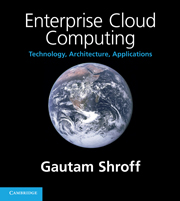Book contents
- Frontmatter
- Contents
- Preface
- List of abbreviations
- Part I Computing platforms
- Part II Cloud platforms
- Part III Cloud technologies
- Part IV Cloud development
- Part V Software architecture
- Chapter 13 Enterprise software: ERP, SCM, CRM
- Chapter 14 Custom enterprise applications and Dev 2.0
- Chapter 15 Workflow and business processes
- Chapter 16 Enterprise analytics and search
- Part VI Enterprise cloud computing
- References
- Index
Chapter 16 - Enterprise analytics and search
Published online by Cambridge University Press: 06 December 2010
- Frontmatter
- Contents
- Preface
- List of abbreviations
- Part I Computing platforms
- Part II Cloud platforms
- Part III Cloud technologies
- Part IV Cloud development
- Part V Software architecture
- Chapter 13 Enterprise software: ERP, SCM, CRM
- Chapter 14 Custom enterprise applications and Dev 2.0
- Chapter 15 Workflow and business processes
- Chapter 16 Enterprise analytics and search
- Part VI Enterprise cloud computing
- References
- Index
Summary
So far we have studied enterprise applications from the perspective of what data they typically need to store, and how business transactions can best be encoded into such applications so as to efficiently process and update such data. We have also seen how the execution of transactions can be orchestrated so as to drive the flow of work between users. Information captured by enterprise systems in this manner is used to drive the operational functions of an organization by maintaining accounts, tracking execution plans, receiving payments or disbursing a payroll.
However, another equally important motivation to maintain data about an enterprise's operations is to unearth hidden patterns and discover knowledge that can improve business strategy or optimize operational processes. Such knowledge discovery tasks are supported by analytical applications. Additionally, with the advent of the web and the ubiquity of internet search, any knowledge discovery or creation exercise today includes web search as an integral supporting activity. This naturally leads to the question of whether similar search technologies can be applied to enterprise information retrieval. Interest in enterprise search has also been fueled by the increasing amounts of text (and other unstructured) information generated and maintained by large enterprises and the use of search technologies to index such data. There is also interest in exploring whether search techniques apply to structured data as well as combinations of structured and unstructured data.
- Type
- Chapter
- Information
- Enterprise Cloud ComputingTechnology, Architecture, Applications, pp. 217 - 240Publisher: Cambridge University PressPrint publication year: 2010



